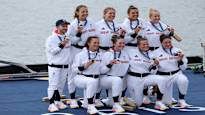Usually, things go like this in the Olympic Games, that athletes tell reporters things, which they pass on as news. On Saturday morning, the opposite happened at the Vaires-sur-Marne rowing stadium.
When Henry Fieldman, 35, came in the media area to Urheilu’s rink, I congratulated him on his handsome, Olympic-historic work. Surprised Fieldman politely asked to clarify the matter, so inch to action.
Fieldman, who had a great career as a cox, became the first athlete to win an Olympic medal in both men’s and women’s swimming. In Tokyo 2021, he coxed Britain’s men’s eight to bronze medals.
On Saturday, Fieldman sat in the back and handed out commands as the British women’s eight raced the 2,000m course to the third fastest of the six final boats.
– Great to hear, I really didn’t know this.
Praise from athletes
Rowed in a bronze boat Emily Ford wanted to praise Fieldman.
– Henry’s calmness, professionalism, spirit and sense of humor have been a huge part of this project. We are really grateful to him.
Rowing has always been part of the program of the modern Olympic Games, i.e. since 1896. Female rowers entered the Olympic Games in 1976.
Shortly after the women’s eights final, Marnejoki’s surface was praised by the men’s eights, and Holland took the silver medals after the British. Now the cox of the men’s rowing boat was a woman, Dieuwke Vetter.
Among the boats left out of the medals, the Italian women were instructed from the back of the boat Emanuele CapponiAustralian men again Brodie Kendall.
The pioneers of the field were men’s coxs Caleb Shepherd and Zhang Dezhang. The New Zealander and the Chinese won medals in their countries’ women’s eights in Tokyo 2021.
Rule change 2017
Behind the interesting phenomenon is the rule change made by the international rowing federation World Rowing in 2017, according to which the coxswain in doubles, fours or eights no longer has to be of the same gender as the rowers. Today, only eight of the coxswain classes are part of the Olympic program.
– We were seen at the Oxford-Cambridge competition (the annual rowing competition of the top universities in London’s Thames). female coxswain already in 1981. I think the international federation changed its rules quite late, said Dieuwke Fetter, 33.
Oxford’s decision to choose Susan Brown to his team 42 years ago was huge news in conservative Britain.
– After the rule change, I knew that I wanted to work in the men’s Olympic project someday. But here, within the rowing family, there has been no issue for years if men have women’s cox or vice versa, Fetter said.
Freedom of choice is important
Henry Fieldman didn’t see much difference in a project the length of the Olympiad, whether the co-workers were men or women.
– First of all, it was important that the rule change left freedom of choice. So women can still choose a woman and men a man if they want. In the end, it’s all about what you can do and, of course, how much you weigh, Fieldman laughed.
The petite man follows a very disciplined diet during and after the value competitions, while Fetter said he had to eat and drink a little extra in the competition village.
Cox’s work in welding is like a weight class sport. If he does not weigh at least 55 kilos at the weigh-in 1-2 hours before the race, additional weight equal to the weight deficiency must be put in the boat, such as a scale or a sandbag.
Intense atmosphere
Fieldman, who participated in the Oxford-Cambridge competition, or Boat Race 2013, in the latter team, said that Cox’s work varies greatly depending on the competition.
It is a different thing to practically command a boat on a straight 2000 meter Olympic track than on a very winding Boat Race route of almost seven kilometers in strong currents.
– In the Olympic Games, the most important task is to set the pace and get the most out of the team physically. The competitive situation on the 2000 meter track is extremely intense, said the Hammersmith, London, who won 12 Olympic, World and European Championship medals.
At Fieldman Middle School, rowing was part of physical education.
– I wanted to row, but I was so small that I wouldn’t even have been able to get the boat moving and I hardly ever could. I was put as cox, and I quickly got excited about it, recalled Fieldman, who had previously played competitive chess, among other things.
Today, the respected professional runs his Coxing Consultancy company, which teaches young coxes the ins and outs of the industry and recruits children to the sport of rowing.
– There are gratifyingly many interested young people.
The trainer’s eyes and ears
Although or because coxs are not physically as strong as rowers in one of the most physically demanding sports in the world, they have another very important job in addition to steering the boat, determining the speed of the pull and creating a spirit.
– A qualified cox is the assistant coach of the boat team: He is the coach’s eyes and ears in the boat, where the coach is of course never, says the coach of the Estonian boat team in Paris Veikko Sinisalo.
At the Paris Olympic regatta, Britain became the number one in the all-time Olympic medal statistics for the classic sport. The balance is now 34 gold, 27 silver and 17 bronze.
The country won three gold, two silver and three bronze medals at Marnejoki. The second and third places in the medal statistics were now left behind by the USA and the GDR, which had already passed away in 1990.
